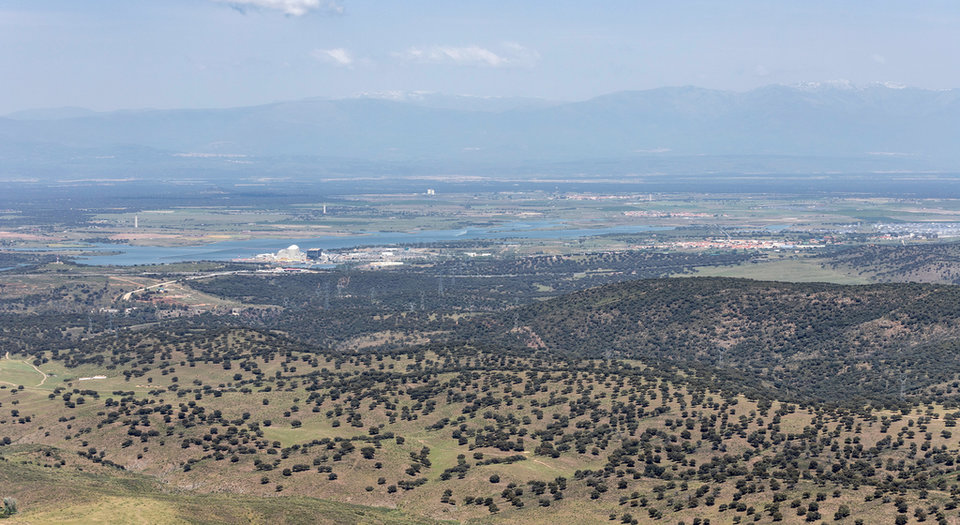
URANIUM
Shock waves: what will a Spanish ban mean for uranium mining in Europe?
The Spanish Government has announced plans to ban the mining of uranium and other radioactive minerals, in a move that it says is in line with the EU energy policy. Yoana Cholteeva takes a look at the proposed ban, its lawful justifications and its prospective impact on Spain’s power and mining industries.
In May 2020, the Spanish Council of Ministers approved a bill to reach a carbon neutral economy by 2050, focused on fossil fuels, hydrocarbons, and fracking. Following this, two left-wing political parties appealed for a stricter plan that includes the removal of uranium mining from the plan.
On 14 October, a series of amendments were proposed to the original draft of the climate change and energy transition bill, with the Spanish Socialist Workers' Party and Unidas Podemos seeking to fully ban the investigation and exploitation of radioactive minerals.
The proposed veto has once again increased tensions between environmental groups, who fear for the impact of uranium mining and other metals on ecosystems, and mining professionals, concerned about the future of the industry in Spain.
If the veto goes through, this will curtail the work of mining company Berkeley Energy, which has been working for decades to legalise the country’s first uranium mine that is still in progress.
Reasons behind the proposed ban
The proposed ban has been welcomed by environmental groups and local organisations concerned about the potential damage to ecosystems in the country and overall safety, as argued by the Spanish organisation Stop Uranio (Stop Uranium). The group, which was established in 2013, has since then been trying to prevent the approval and construction of Berkley Energy’s uranium mining project in the Campo Charro area of Salamanca.
For the past seven years, Stop Uranio has organised a number of campaigns and protest rallies over the country, with activists from both Spain and Portugal raising concerns over Salamanca’s agriculture lands, pastures, rural tourism, and the population’s health being at stake.
Stop Urani0 member and spokesperson Jose Manuel Barrueco has written in The Free - blog of the post capitalist transition, that “the majority of the inhabitants of the area oppose the planned mines due to the negative effects that this activity will entail for the region: explosions with release of radioactive dust into the atmosphere, the continuous transfer of trucks and heavy machinery, loss of forest, diversion of water courses, etc.”.
It terms of scientific evidence to support some of the claims, according to a 2013 peer reviewed article, ‘Uranium mining and health’, published in the Canadian Family Physician journal, the chemical element has the potential to cause a spectrum of adverse health effects to people, ranging from renal failure and diminished bone growth to DNA damage.
The majority of the inhabitants of the area oppose the planned mines.
The effects of low-level radioactivity include cancer, shortening of life, and subtle changes in fertility or viability of offspring, as determined from both animal studies and data on Hiroshima and Chernobyl survivors.
However, due to possessing both chemical toxicity and radioactivity, assessing the relative contributions of each to its toxic profile becomes difficult, which imposes the need for separate studies to be conducted in order to assess individual risks.
Left-wing MP Juan Lopez de Uralde has in turn voiced his support of a holistic approach, telling the Spanish online newspaper Publico that banning uranium extraction is directly linked to the energy policies of both Spain and the EU. He continued that “since no uranium mine is active in the Old Continent”, “by committing to the closure of nuclear power stations we should complete the circle entirely by banning uranium mining”.
Is the Spanish uranium ban unconstitutional?
When it comes to the sole implementation of the proposed ban, a few groups, including Berkley Energy, have raised concerns over the legal grounds on which the country is seeking to implement the uranium ban.
According to the acting dean of Nazarbayev University School of Mining and Geosciences in Kazakhstan, Dr Randy Hazlett, the ban is unjustified, especially as “the Spanish moratorium initiative came as an amendment to an otherwise unrelated climate change bill targeting fossil fuels reductions”.
President of the Spanish National Confederation of Mining and Metallurgy Entrepreneurs Vicente Gutiérrez Peinador has also expressed his doubts over the legality of the proposed ban.
He says: “The proposed amendment to the articulation of the Draft Law on climate change and energy transition would be unconstitutional for violating the provisions of article 9.3 of the Spanish Constitution, which guarantees the non-retroactivity, among others, of the restrictive rules of individual rights, legal certainty, responsibility, and the interdiction of the arbitrariness of public authorities.”
The proposed amendment to the articulation of the Draft Law on climate change and energy transition would be unconstitutional.
Another constitutional controversy is created by the fact that Berkeley Energy has already acquired all the permits needed to start operations. In addition, the company has also signed two contracts for the sale of its production internationally, with both contracts being signed and validated by the Euratom Supply Agency, as uranium commercial matters are regulated by the European Commission through Euratom.
Peinador also adds: “A retroactive and expropriating measure of Berkeley Mining acquired and consolidated rights would also infringe Article 33 of the Constitution (and Article 17 of the Charter of Fundamental Rights of the EU), depriving Berkeley of its existing rights and its legitimate expectations arising from existing permits (granting exploitation of, research permits, etc.) without justifiable cause of public utility or social interest.”
Alongside this, “article 122 of the 22/1973 Spanish Mining Law, states that ’any prohibition contained in the management instruments on activities included in the Mining Law must be reasoned and may not be generic in nature’”. In the meantime, there is no rigid data yet to support the argument that uranium mining in the Salamanca area specifically would affect the environment and people’s wellbeing.

// 3D System Model and Completed Installation. Credit: Deimos
Harm to the Spanish mining and power industries
According to Berkeley Energy’s own published feasibility study on the proposed Salamanca mine, scrapping the project would effectively take 4.4 million pounds of uranium off the world market, which is seen as a significant loss. In addition, the ban would also affect current and future direct jobs, the company’s indirect industry traction, as well as local arrangements and benefits.
Peinador also emphasises that the amendment of legislation includes “geological investigation of all the radioactive minerals” as a generic term, without giving a threshold on what “radioactive minerals” are.
He says that this unclarity could also harm the prospects of other minerals such as the fertiliser mineral potash, which has a very small proportion of a radioactive potassium isotope K40.
“We are very worried about this argument being used to also ban rare earths mining projects, as some of their minerals could have a small and not harmful radiation at all,” Peinador adds.
We are very worried about this argument being used to also ban rare earths mining projects.
When it comes to the impact of the prospective ban on the local energy industry, the European Commission has estimated that Europe receives 30% of its electricity from nuclear power and nuclear represents more than half of Europe’s present clean energy portfolio. Despite this, nuclear energy is not included in the European Green Deal that concentrates on energy generation.
Based on this, Hazlett points out that “long term need for nuclear fuel in Europe is uncertain, but decreasing nuclear energy dependency will surely slow down any efforts to meet aggressive decarbonisation targets”.
Moreover, as Spain is currently majorly independent from the EU grid, with 2017 data showing the country generating 23% of its power from natural gas, 21% from nuclear, and 18% from wind, electricity self-sufficiency is of paramount importance to the country. With such a high percentage of Spain's energy coming from nuclear, a ban on uranium mining and its use could appear problematic to achieving a net-zero carbon economy by 2050 in line with the Paris Agreement.
// Main image: 3D System Model and Completed Installation. Credit: Deimos
Can the uranium mining ban be halted?
While the impact of the uranium ban is being assessed from different points of view, it is important to note that this is only a proposed amendment to the draft climate change and energy transition bill. The legislation must now be reviewed and approved or rejected by the Commission of Ecological Transition of the Congress of Deputies (the lower house of the Spanish Parliament), and subsequently follow the same process in the Senate.
In order to receive a final approval, the processes in the Congress and the Senate must be consistent, and the proposed amendment must be supported by a majority of votes in both commissions.
While environmental groups and left-wing parties have joined forces to advocate for implementation of the ban, mining industry officials are now following steps to battle the approval of the ban.
A final step for opponents of the ban would be to take it in front of the Constitutional Court.
A first step is already in progress as, with the proposed draft before the Congress, mining professionals are working to convince the deputies to vote against or modify the proposed text.
A final step for opponents of the ban would be to take it in front of the Constitutional Court, officially questioning its constitutional legality.
While the proposed ban is only a local amendment, unlikely to influence other European policies, the implementation of the ban poses serious risks to the outlook of the Spanish mining and power industries, which could also impede Europe’s prospects to successfully achieve its net-zero ambitions.
// Main image: 3D System Model and Completed Installation. Credit: Deimos